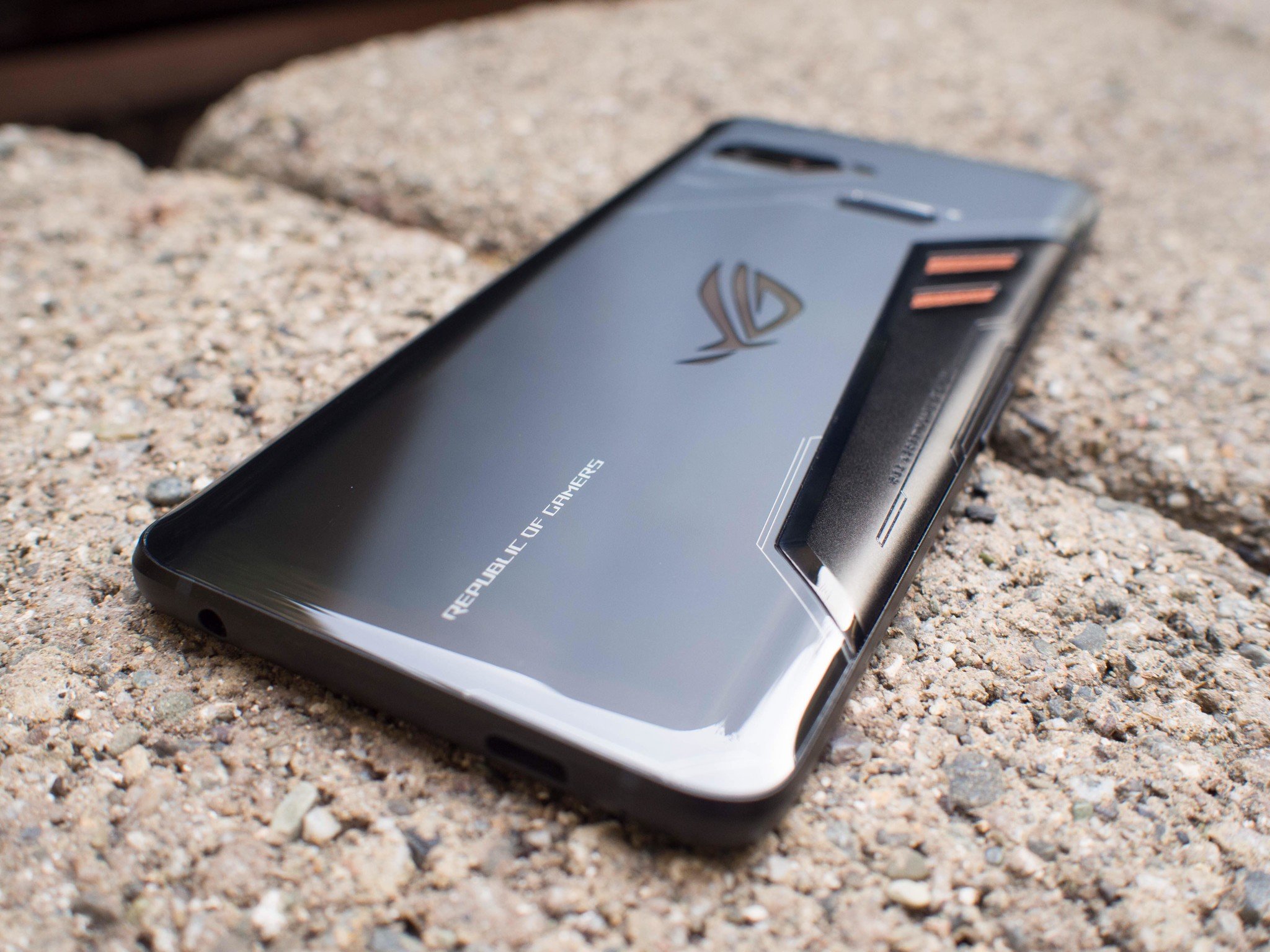If you'd asked me two months ago what my least favorite smartphone trend in the last couple of years was, I'd have said the rise of the "gaming phone" was pretty close to the top. And a lot of that has to do with the minimal effort that went into creating what I we're supposed to believe is a premium experience for gamers. But when you sit these phones next to a Galaxy Note 9, what really stands out? A higher refresh rate on an aggressively mediocre display and some LEDs that change color in whatever patters you set up? Seriously? Why would I pay extra for that, when my existing high end smartphone plays games really well?
Asus is the first company with a product that actually answers this question. The ROG Phone does offer a high refresh display and LEDs you can customize, but it also has specialized hardware not available on any other phone that genuinely improves the gaming experience. And if that wasn't enough, you can also get a TON of amazing hardware accessories that take your mobile gaming experience to places I had never even considered.
I'm putting this out there right now, the ROG Phone isn't just a great gaming phone, I think it's the only real gaming phone. And the new standard by which every other gaming phone is judged.
Pros:
- Display is pretty great
- Air Trigger system is incredible
- Game Streaming is well implemented
- Battery life is solid
- Speakers are super loud
Cons:
- Design is VERY gamer-y
- Camera is just okay
- Accessories are pricey
About this review
I am writing this review after using the ASUS ROG Phone for 24 days in Baltimore, Maryland and San Francisco, California. The phone was paired to Verizon and T-Mobile, and has received four software and security updates over the course of the review.
ASUS ROG Phone Design and hardware
The ASUS Republic of Gamers brand has been around for quite a while, existing mostly as a high end gaming laptops and desktops. And like all gaming-themed computers, the ROG line has a particularly obnoxious aesthetic. Lots of black and red and chrome, with hard angles and glowing lights. These are not subtle machines, but that's by design. When you see someone using a ROG product, it is immediately clear that is what they are using.
It looks like it was built with recycled Mountain Dew Gamer Fuel cans in the sick motorcycle shop inexplicably attached to the side of a Guy Fieri restaurant, but there's quite a bit of function to go with that form.
As such, it should come as no surprise that the ROG Phone features a lot of these same aesthetic choices. On the one hand, this design is a breath of fresh air. In a sea of nearly identical minimalist glass slabs, the hard lines and bold colors of the ROG Phone stands out and demands you pay attention to it. On the other hand, this phone looks like it was designed by a 14-year old boy and I really wish I had a case for this thing so I wasn't broadcasting the hardcore gamer bro aesthetic while sitting in a meeting with my accountant.
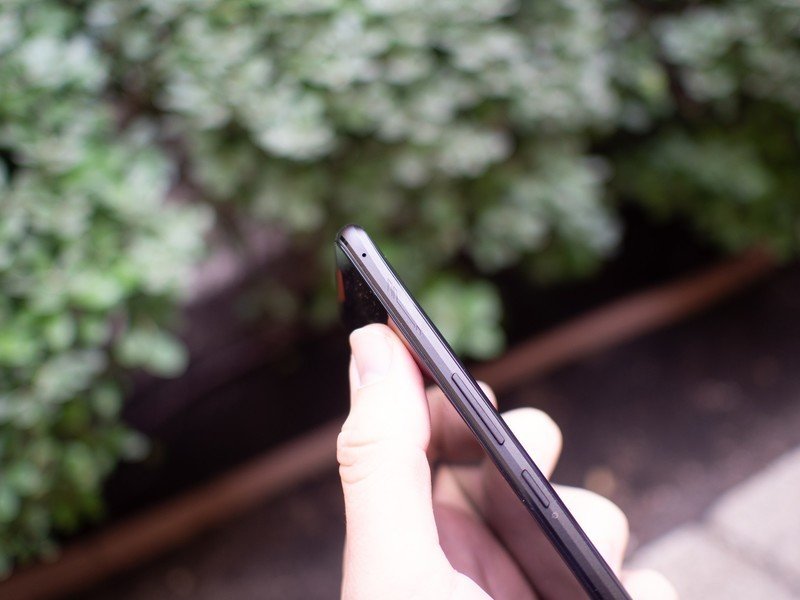
While the phone may look like it was built with recycled Mountain Dew Gamer Fuel cans in the sick motorcycle shop inexplicably attached to the side of a Guy Fieri restaurant, there's quite a bit of function to go with that form. The front of the phone is home to a pair of speakers tucked behind bright orange cut-outs, but they're louder than most phones so the attention drawn to them is deserved. The back of the phone has a pair of copper-colored things that look like they could be exhaust vents, and that's because that's exactly what they are.
But this design is a big part of what allows the overclocked CPU inside to run at higher speeds without issue, so the attention drawn to it is deserved. The sides of the phone have textured grooves and fun designs etched all over, but those grooves are where the air triggers live so you can game like no other phone, so the attention drawn to it is deserved.
But the weirdest thing about this phone, the thing you're likely to notice shortly after holding the phone for the first time, is the little bit of rubber on the one side. It's not visually obvious when looking at the phone, but you can't help but feel it when you pick the phone up. This rubber stopper is protecting a second USB-C port and data port, separate from the one on the bottom you would normally use for charging the phone.
This is one of many super powers the ROG Phone has, a second port to connect to a massive collection of accessories made just for this phone. Not accessories made by third parties you might be able to get in the future, actual hardware you can buy and use right now. But when you aren't using those accessories, you get this little rubber stopper on the side of the phone. And yes, ASUS includes several spare rubber stoppers in the box for when you inevitably lose the one included on the phone when you take it out of the box for the first time.
Make no mistake, this is a weird phone. The fingerprint sensor is in a weird place and isn't great. It looks funny on a table, it feels funny in your hand, and it's not like any other phone you've ever used thanks to the accessories. But that's what makes this design so brilliant. Alone, each of these little quirks make for a funny little anecdote on a mostly ok phone. Together, these features create a small game console that also makes phone calls.
ASUS ROG Phone Software and camera
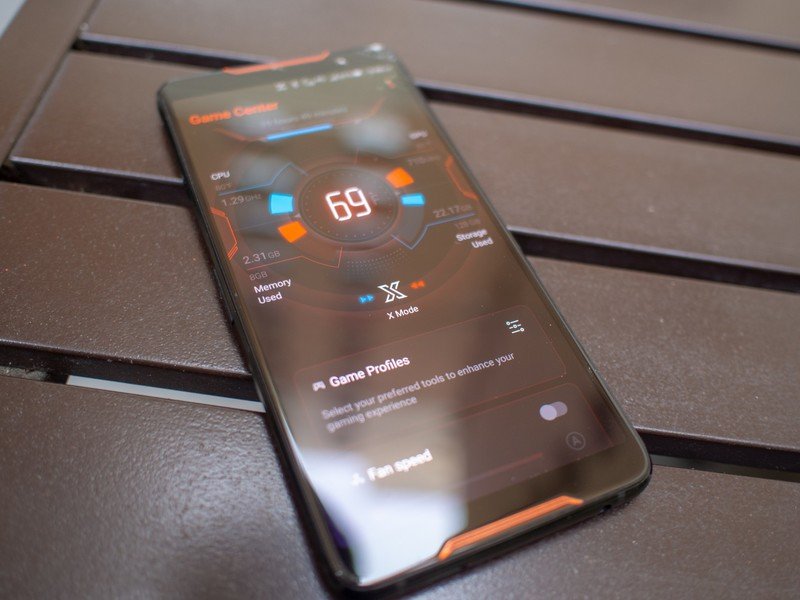
While the outside of this phone looks like the kind of thing a prop guy from the 90s would dream up as a communicator for a bad Sci-Fi show, the software mostly resembles the experiences from the last generation of Android. In an attempt to make sure everything had that "gamer" aesthetic, everything has primary colors and the UI skips over things like gesture controls and quick access to virtual assistants. This isn't necessarily a bad thing, especially if you're not overly fond of the painfully simple experience Google has been pushing with its Pixel phones, but it's interesting to see how unassuming most of the software you see when first using this phone is.
There are very few pre-loaded apps in the app drawer, and nothing in the software ever caused anything to feel sluggish. Everything from unlocking the phone and launching the camera to playing Fortnite felt nice and fast. Side by side with a Pixel and a Note 9, the ROG Phone consistently launched apps faster and actually got you into a game faster. The software is clearly taking advantage of the boost in the hardware, and while the UI may look a little plain it is well optimized. When you aren't playing a game, this phone is very simple and straightforward which I really appreciated.
The reason for this simplicity is pretty great. You only really get the "serious gamer" features when you're playing a game. Novel approach, right? There's very little about using the phone when writing an email or making a phone call which summons that over-the-top aesthetic, but all of that changes when you fire up a game. And it's so good when that aesthetic changes over.
This phone gets you 90% of the way to having a gamepad attached to the phone, without needing any other hardware at all.
Game Mode on the ASUS ROG Phone is nothing like anything you've ever used before. The software has dozens of features for you to tweak, from notification bothering you to how fast you want the CPU to run and what apps are allowed to continue living in memory when you game. If you want everything to close and every ounce of power to be dedicated to playing the game, you can do that. If you want the internal game streaming service to launch and all of the notifications to go away and the volume to lower when you open a game, building that profile is simple and works every time. You are truly the master of your environment here, and it's all built in to the phone directly.
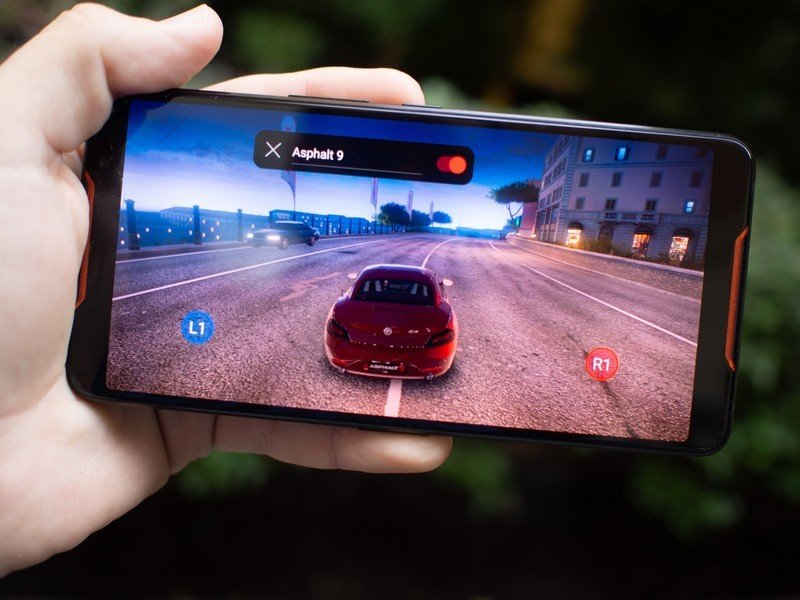
The best feature by far, however, is air triggers. When you press down on the two grooves at the sides of the phone, you press virtual buttons on the screen. These aren't physical buttons, mind, you, just sensitive areas on the phone that detect pressure. It's like the squeeze feature on a Pixel or HTC phone, but for gaming. It's like having bumpers or triggers on a gamepad, but for every game ever. Some of the more popular games in the Play Store have presets for air triggers, where all you need to do is open the game and when you press the buttons they are already assigned to popular functions.
When playing Asphalt 9, for example, I already had air triggers for brakes and Turbo. But for games that aren't pre-assigned, you just pause the game and assign the zones yourself. The air trigger software is super easy to use, and lets you drag buttons anywhere. You save the profile for the game you are playing, and it is always there for you in the future. I found this incredibly useful for so many games, and it makes a massive difference in how much fun a lot of mobile games are to play. It gets you 90% of the way to having a gamepad attached to the phone, without needing any other hardware at all.



As exceptional as this phone is for playing games, that's exactly how mediocre the camera is. It's not a bad camera, it's just not special or fun in any way. During the day it took great photos with access to pretty reasonable HDR features, and in low light it struggled a bit. This felt like using a decent camera on a $500 phone, it'll get the job done well enough but you're unlikely to ever be wowed by any of the pictures you get from it.
ASUS ROG Phone Accessories
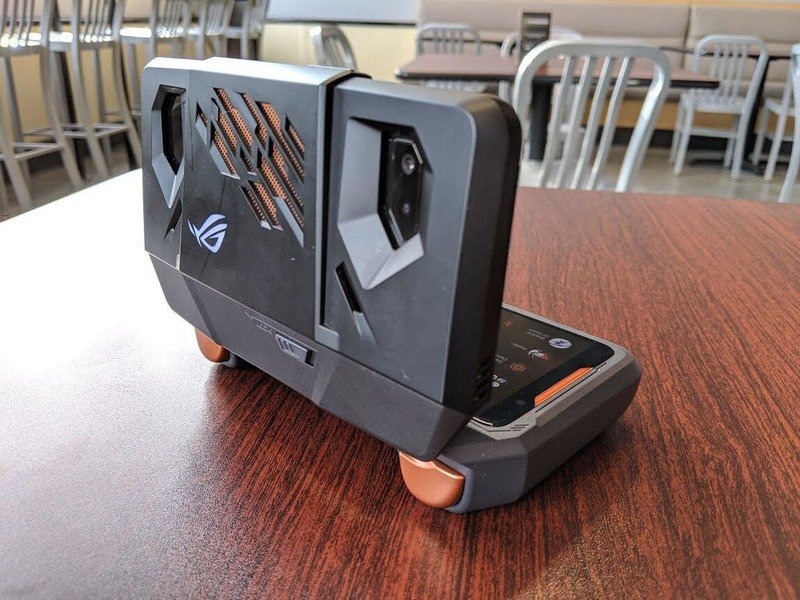
We don't usually spend a lot of time in reviews talking about the things you can attach to a phone, but in this case, you almost have to. ASUS didn't make this phone to exist in a vacuum. The accessories not only matter, but they completely change the way you'd use this phone if you decide to invest in them. Here are some quick thoughts on the ones we've used so far:
AeroActive Cooler
This accessory is included in the box, and it's pretty funny. You clip this on to the phone, and it gives you a USB-C port and headphone jack on the side of the phone. That means when you're holding the phone in landscape, you don't need to worry about the cables getting in your way. When you connect this accessory, the ROG lighting on the back of the phone is copied over to the LEDs on here, so you can continue to show off your lighting. There's also a little fan in this accessory, which is supposed to help keep the phone and your fingers cool while you're gaming. The fan blowing on the fingers is a nice touch, but the real feature here is the cable management in my opinion.
Professional Dock
Connect this to the USB-C port, and you get a pair of USB 3 ports, an HDMI port, and a USB-C port for charging. The idea is you'd be able to connect this to a mouse, keyboard, and monitor to have a "work" environment. It's a cool idea, but like most Android-based things there's just not enough in the software to make this worth using and carrying around. You'd be better off getting a wireless keyboard and a USB-C-HDMI adapter of some kind, which still wouldn't be great.
Mobile Desktop Dock
Take that Professional Dock idea, add an active cooler and support for headphones, DisplayPort, Thunderbolt 3, and add in an actual dock for the side USB-C port, and you've got the Mobile Desktop Dock. This runs into the same functionality problems of the Professional Dock, but it's way better suited for playing a game on a bigger screen. I wouldn't want to take this anywhere, but having it next to my television so I can grab a gamepad and have some fun on a larger screen is pretty great.
TwinView Dock
Snap your ROG Phone into this impressive box, and get physical triggers in a comfortable grip case and a second touch screen identical to the one on your phone. This allows you to play games on one screen while keeping a browser or Twitch chat open on a second screen, and the cooling system in the case keeps everything nice and happy. The dock has its own battery to keep the phone charged, but can also be powered from USB-C and has its own 3.5mm headphone jack. And yeah, if you really want to, you can play two games at the same time on this thing because it genuinely doesn't care what you do with that other display. It's absurd, and I absolutely love it. If you get any of the ROG Phone accessories, make it this one.
Not tested accessories
ASUS has a ton of other accessories for this thing coming next year, including a GameVice to add a gamepad to either side of the display and a WiGig display dock so you can wirelessly play games on your television. I haven't been able to use either of these yet, but I have used other GameVice grips before and they're excellent. We'll be doing more with these accessories in the future!
ASUS ROG Phone Bottom Line
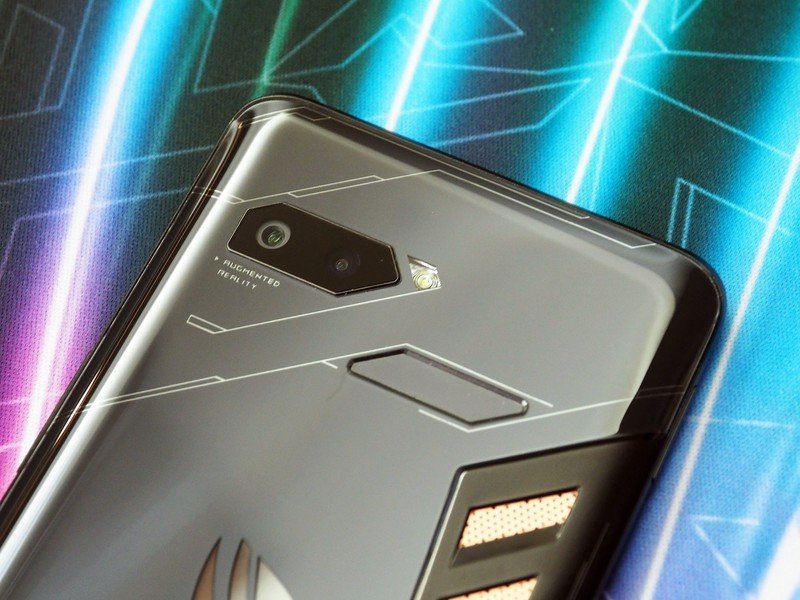
I hesitate to call this a phone. It's a game console with an internet connection and the ability to make phone calls. This is not something you buy if you occasionally play Pokemon Go and Angry Birds. This is for the PUBG Mobile junkie who wants to be able to stream while the play on the go and still have a great experience, but also wants to be able to check email and take photos sometimes.
Everything else on the market that calls itself a "gaming phone" should be ashamed at how much better this experience really is.
There are a lot of great phones out there right now, and you can play games on any of them and have roughly the same experience. But if you really enjoy mobile gaming, and you know that is what you spend most of your time doing on your phone, the ROG Phone goes out of its way to offer a ton of features and accessories to make that experience unquestionably better. And honestly, everything else on the market that calls itself a "gaming phone" should be ashamed at how much better this experience really is.
4.5 out of 5
Make no mistake, you're going to pay for all of those bells and whistles. At $900 for the base model and considerably more for the accessories, this experience is not cheap. But for more than a few people out there, the overall experience is absolutely worth it.
